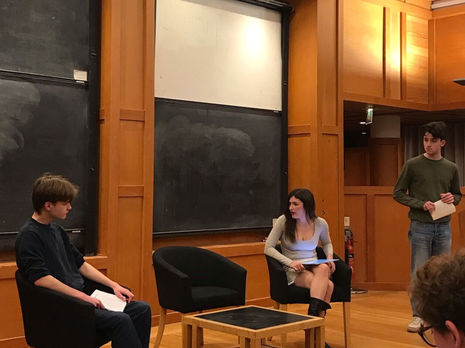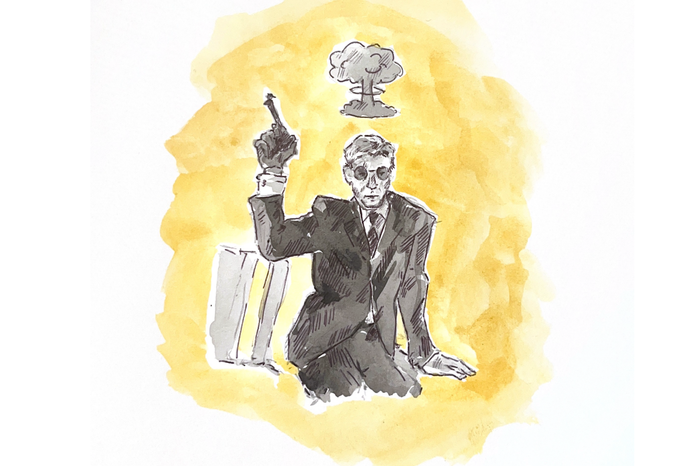Copenhagen: where history and memory collide
This ambitious play provides much food for thought, even if its material proves a little too daunting

“No one understands my trip to Copenhagen. Time and time again I’ve explained it…The more I’ve explained, the deeper the uncertainty has become. Well, I shall be happy to make one more attempt.”
The premise of Michael Frayn’s Copenhagen is a simple one: to understand why German physicist Werner Heisenberg visited his colleague Niels Bohr in Copenhagen, in the autumn of 1941. The Second World War had broken out, and Denmark was occupied by Nazi forces. As the Wehrmacht poured eastwards into the Soviet Union, Allied and German physicists had been tasked with grasping the novelty brought by nuclear fission: was it possible — and indeed practical — to build an atomic bomb?”
Copenhagen is a remarkably radical play. Relying so heavily on the historical record to construct and reconstruct versions of Heisenberg’s 1941 visit, it is nevertheless unconstrained by narrative linearity or the passage of time. The cast are tasked to experiment with different preconditions, narratives, and chemistry as the two physicists, Bohr (David Chataway) and Heisenberg (Will Bennet) attempt to ascertain through trial-and-error the ‘true’ story of their meeting. In this endeavour, they are successful: Frayn’s circularity — illustrating the tortuousness of the characters’ continual rethinking of their relationship — is well-conveyed. The decision to make use of elements of costume — a coat, and a hat — and Heisenberg returning to ring “the familiar bell-pull” is commendable, and grounds the ambiguous narrative in moments of clarity.
“Was it possible — and indeed practical — to build an atomic bomb?”
Also successful as a foil to the difficulties presented by Frayn’s writing is the production’s use of lighting and projection. Whilst the Winstanley Lecture Theatre in Trinity is a less-than-ideal venue for such an agitated script, lighting is well-deployed from the beginning to illuminate the differing perspectives that Heisenberg and Bohr hold as preconceptions (or perhaps end up with) outside of the primary narrative of reconstructing the meeting itself. Equally, the use of imagery on the school-like blackboards backdropping the stage is especially useful to contextualise Heisenberg’s journey — both physical, by train, intellectual, and emotional — that brought him to Copenhagen. I wanted to see more experimentation with projection, for instance in illustration of the repeat motif of skiing, which serves as a reference to the power of human instinct.
Given the continuity of the setting and circular plot elements, a lulling of the play to appear repetitive was a dangerous possibility. However, directorial choices largely swerved this pitfall: the 1941 meeting was at times conducted seated in Bohr’s house, walking through the streets of Copenhagen, and, in the second act, in a combative debating format, complete with ferocious chalking of the blackboard backdrop. Chataway and Bennet successfully brought out the idiosyncrasies of their characters’ relationship — at-times consentient and jarring in equal measure — in an emotional space all-the-more heightened by Bohr’s Jewish heritage and Heisenberg’s work for Hitler’s government. Both actors captured the discordant depth to their characters: for Chataway, Bohr’s sharpness and discomfort was well-juxtaposed with an overriding goodness; for Bennet, Heisenberg’s innocence and pragmatism appeared unendingly challenged by a complex network of allegiances and principles. Whilst the intensity illustrative of any crossover between such great minds very much came across, I felt that heightened energy levels would have brought an intoxicating emotional rawness to Bohr and Heisenberg’s relationship, backdropped as it was by the harrows of war.
“Improved signposting would have more illuminated the plot to a largely unfamiliar audience”
Bohr’s wife Margrethe (Luca Zislin) was seen observing — and often intervening in — her husband’s dialogue with Heisenberg. Her controlled performance brought balance to what could have become an overbearing duologue, frequently breaking up the longer passages and aiding our understanding of the often-complex nuclear physics. Indeed, it felt as if Frayn had not written sufficient depth to the character to enable the gripping performance the character deserved, and we were left wanting in our glimpses of Margrethe: her bursts of passionate intervention were too few and far between.
Whilst the bold decision to perform the play unabridged led to an extended two-hour run time, the timeless arc of the plot would have made making cuts, without sacrificing understanding, difficult. That being said, Frayn’s at times inconsonant dialogue and meandering narrative created space for confusion. For instance, repeated references to a later 1947 meeting between the Bohr and Heisenberg meant that, at times, it was difficult to deduce which moments were retellings of the events of 1941, and which were retrospective commentary. Whilst director Henry Jaspars successfully created a sense of contrast and modulation to combat the circularity of the script, I felt that improved signposting would have more illuminated the plot to a largely unfamiliar audience.
The Dryden Society’s production of Copenhagen is an ambitious performance of an ambitious play. Whilst the many layers of Frayn’s script provide a significant challenge, to successfully take on the story of two inexorably complex figures — meeting impossibly at a haunting time — is a significant achievement. Supported by a talented cast, the show’s crew have left their testament to that end of morality, the dawn of the atomic age. As we grapple with some of the same empirical, ethnical, and personal questions as Bohr and Heisenberg, their meeting — in an ordinary house, on an ordinary Copenhagen street — is no less relevant today than it was in late-September (or early-October), 1941.
Want to share your thoughts on this article? Send us a letter to letters@varsity.co.uk or by using this form.
 News / Judge Business School advisor resigns over Epstein and Andrew links18 February 2026
News / Judge Business School advisor resigns over Epstein and Andrew links18 February 2026 News / Gov grants £36m to Cambridge supercomputer17 February 2026
News / Gov grants £36m to Cambridge supercomputer17 February 2026 News / Union speakers condemn ‘hateful’ Katie Hopkins speech14 February 2026
News / Union speakers condemn ‘hateful’ Katie Hopkins speech14 February 2026 News / CUCA members attend Reform rally in London20 February 2026
News / CUCA members attend Reform rally in London20 February 2026 News / Right-wing billionaire Peter Thiel gives ‘antichrist’ lecture in Cambridge6 February 2026
News / Right-wing billionaire Peter Thiel gives ‘antichrist’ lecture in Cambridge6 February 2026










